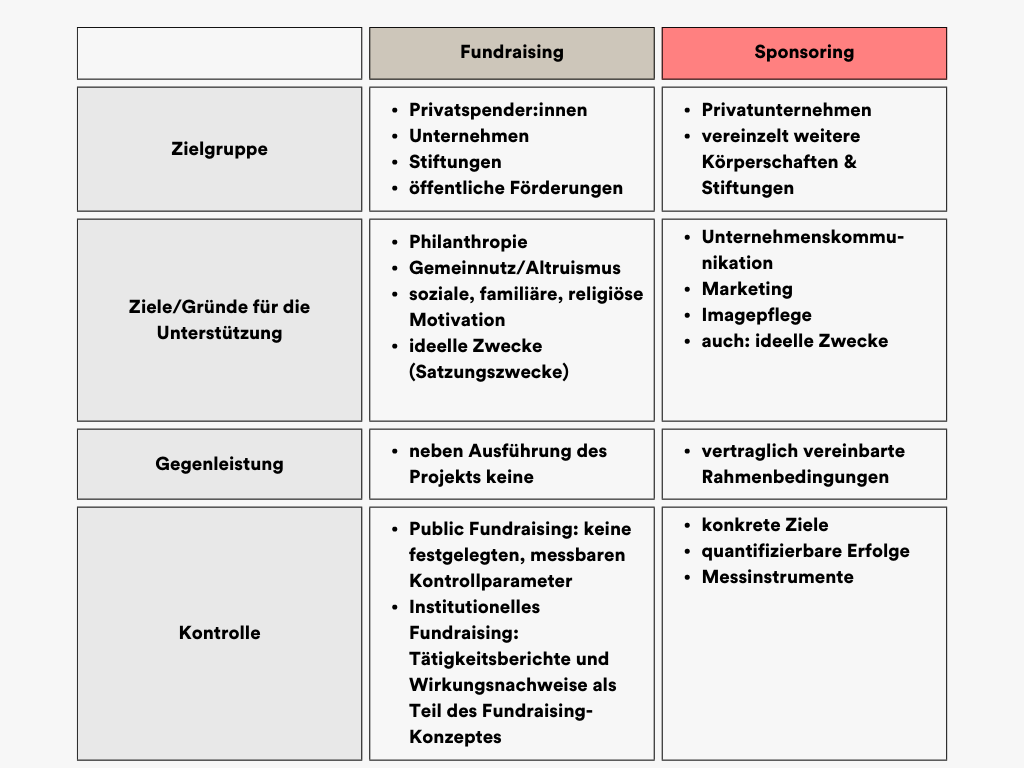
Sponsoring: Open Potential for Fundraisers
Sponsorship is not only an attractive financing option in top-class sports. Non-profit organizations and foundations in Switzerland can also benefit from sponsors and thus exploit another way of raising funds. For companies, sponsoring a good cause is in turn an interesting marketing tool. Despite many similarities, the difference between fundraising and sponsorship is crucial. The most important distinction between fundraising and social sponsorship is the consideration that the sponsor receives for his or her support. A direct comparison reveals exactly how fundraising in the sense of donation marketing differs from sponsorship.
Comparing Fundraising and Social Sponsoring
In the non-profit context, sponsorship primarily means support from private-sector companies. Foundations and public agencies, which, like sponsors, require contractual agreements for the allocation of funds, are more commonly referred to as funders. The most important goal of sponsorship is corporate marketing. By becoming a sponsor, companies aim to raise awareness of their brand, exploit new target groups and advertising contexts, and improve their image by supporting a social, environmental or other idealistic cause.
That is why there is a sponsorship contract between the organization and the sponsor, in which benefits (cash, in kind or services) and consideration of the project sponsor are recorded. It is common, for example, for the sponsor to be named in campaigns and events and for the company logo to be displayed on the website, posters and information materials. In addition, the sponsor is often allowed to advertise the sponsorship, for example on its own website, in newspaper articles or on the products themselves.
The purpose of the project also plays a role for the companies and should be checked for compatibility by both sides.
In fundraising, however, the project activity is the only recorded consideration. In public fundraising (= donations from private individuals), this is also not further measured or controlled, except through voluntary reporting of the project, which is appropriate in the course of donor care. In institutional fundraising (= funding by public institutions or grant giving foundations), proof of impact is an integral part of the fundraising concept. And in sponsoring , analysis, planning, implementation and control play an important role; after all, the support should be economically worthwhile for the sponsor.

Is Sponsorship Tax-Deductible: Insights from Swiss Tax Law
Businesses can make tax-deductible donations to a non-profit, tax-exempt organization. But what is the tax situation for sponsorships? Although the exact definitions and legislation differ from canton to canton, sponsorship contributions in Switzerland are in principle considered advertising expenses and can therefore be deducted from tax. Especially when supporting small associations and organizations that do not enjoy tax exemption because they are not considered altruistic by the cantons or because they do not meet the administrative requirements, sponsorships are a popular and attractive alternative to donations – both for the sponsors and the recipients.
Eco, Cultural and Social Sponsoring: Finding Sponsors for Social Projects and Associations
If you want to find sponsors for your social project or NGO, a sponsoring concept, similar to the fundraising concept, is helpful. By being clear about which companies are appropriate for your organization and purpose, and what you can offer sponsors in return, you’ll make an intelligent pre-selection. A company whose activities are antithetical to your project goals is unlikely to be interested in sponsorship. The wrong sponsors can also damage the credibility of your project. To put it bluntly: if a climate protection project cooperates with a coal-fired power plant, this cooperation can quickly be seen as “greenwashing” by the company and damage both your image and that of the sponsor.











